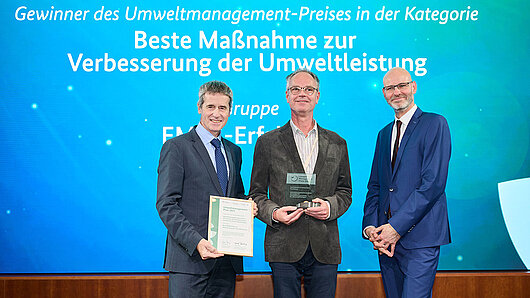High-Performance Computing Center Stuttgart

The prize was presented in the Haus der deutschen Wirtschaft in Berlin during the conference “30 Years of EMAS — a Sustainable Success.” The competition is organized by the German Federal Ministry for the Environment, Climate Action, Nature Conservation, and Nuclear Safety (BMUV) together with the Austrian Federal Ministry of Agriculture and Forestry, Climate and Environmental Protection, Regions, and Water Management (BMLUK).
“We are extremely happy about this award, which underlines our engagement in sustainable computing and responsible energy management,” said Prof. Dr. Michael Resch, Director of HLRS. “With PowerSched we are demonstrating that supporting both cutting-edge research and climate protection is no contradiction. Rather, they strengthen one another.”
In 2024 HLRS began using a method for dynamic power capping developed in cooperation with HPE — PowerSched — on Hawk’s production environment. PowerSched distributes available power across a supercomputer’s compute nodes in a targeted manner. How much energy each node receives depends on which application is running on it at a given time. Computationally intensive programs receive more power, while memory bound applications are assigned less energy. The system continuously monitors and regulates the distribution of power in order to maintain an optimal balance at all times. This enabled Hawk to use available energy as efficiently as possible and to respond flexibly to changes in the computing center’s energy and load budget.
By implementing this method, HLRS was able to reduce the power needs of its supercomputer by approximately 0.8 Megawatts. These savings are comparable to the annual power usage of approximately 1,500 single-family homes.
HLRS’s use of PowerSched is part of a comprehensive sustainability strategy, which also includes construction of a new, particularly energy-efficient data center called HLRS III and the use of all waste heat to supply the University of Stuttgart’s Vaihingen campus. In the future, HLRS plans to implement PowerSched on GPU-based systems, including its current high-performance computer, Hunter, and its future supercomputer, Herder, which is scheduled to go into operation in 2027.
“As the first EMAS-validated high-performance computing center in Europe, we see it as our responsibility to pioneer new approaches for sustainable technologies,” added Dr. Norbert Conrad, environmental management officer at HLRS. “Receiving the Environmental Management Prize confirms that we are on the right path.”HLRS openly publishes knowledge gained through its efforts to improve sustainability, making it publicly accessible for other data centers and research institutions. In this way, the center makes important contributions to the reduction of energy usage across the entire field of scientific high-performance computing. HPE will also integrate the core concepts behind PowerSched into its HPE Cray Supercomputing User Services software. In the future, this will enable HPE-Cray clients to implement comprehensive energy management.
The Environmental Management Prize is awarded annually to organizations in Germany and Austria who have made extraordinary contributions to environmental, climate, and nature protection through use of especially innovative and effective approaches within the scope of the European Eco-Management and Audit Scheme (EMAS).
The High-Performance Computing Center Stuttgart (HLRS) was established in 1996 as Germany’s first national high-performance computing center. As a research institution affiliated with the University of Stuttgart and a founding member of the Gauss Centre for Supercomputing — the alliance of Germany's three national supercomputing centers — HLRS provides state-of-the-art HPC services to academic users and industry. HLRS operates one of Europe's most powerful supercomputers, provides advanced training in HPC programming and simulation, and conducts research to address key problems facing the future of supercomputing. Among HLRS's areas of expertise are parallel programming, numerical methods for HPC, visualization, cloud computing concepts, high-performance data analytics (HPDA), and artificial intelligence.
Funding for Hawk and its successors Hunter and Herder is provided by the Baden-Württemberg Ministry for Science, Research, and the Arts and the German Federal Ministry of Education, Research, Technology, and Space through the Gauss Centre for Supercomputing (GCS). HLRS's sustainability activities are funded by the Baden-Württemberg Ministry of Science, Research and the Arts.
Sophia Honisch, High-Performance Computing Center of the University of Stuttgart (HLRS),
Tel.: +49 (0) 711 / 685-68038, honisch(at)hlrs.de
Prof. Dr. Michael Resch, High-Performance Computing Center of the University of Stuttgart (HLRS),
Tel.: +49 (0) 711 / 685-87200, resch(at)hlrs.de